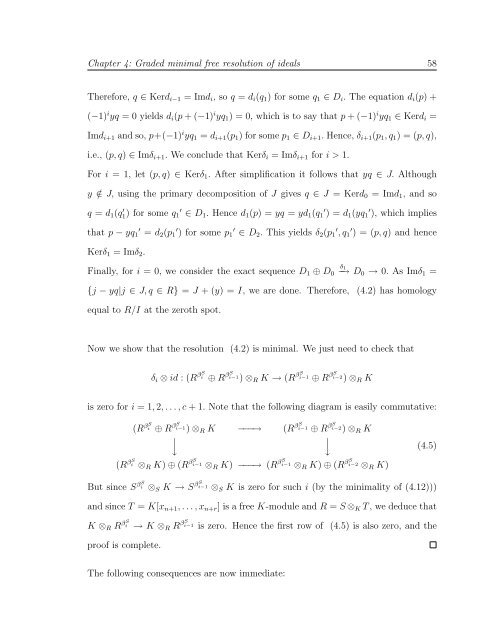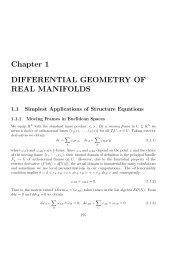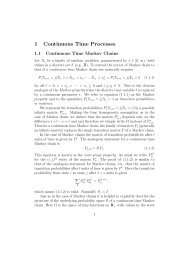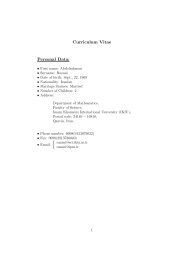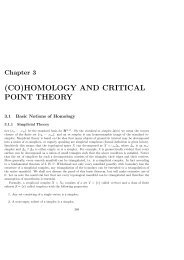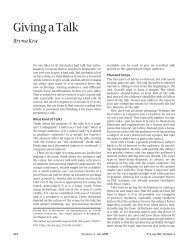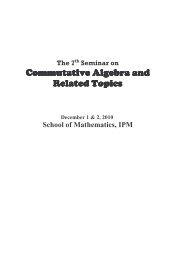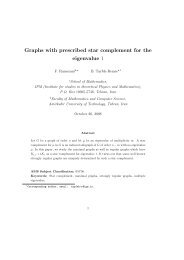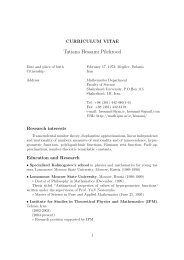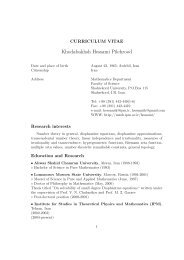Betti numbers of modules over Noetherian rings with ... - IPM
Betti numbers of modules over Noetherian rings with ... - IPM
Betti numbers of modules over Noetherian rings with ... - IPM
Create successful ePaper yourself
Turn your PDF publications into a flip-book with our unique Google optimized e-Paper software.
Chapter 4: Graded minimal free resolution <strong>of</strong> ideals 58<br />
Therefore, q ∈ Kerdi−1 = Imdi, so q = di(q1) for some q1 ∈ Di. The equation di(p) +<br />
(−1) i yq = 0 yields di(p + (−1) i yq1) = 0, which is to say that p + (−1) i yq1 ∈ Kerdi =<br />
Imdi+1 and so, p+(−1) i yq1 = di+1(p1) for some p1 ∈ Di+1. Hence, δi+1(p1, q1) = (p, q),<br />
i.e., (p, q) ∈ Imδi+1. We conclude that Kerδi = Imδi+1 for i > 1.<br />
For i = 1, let (p, q) ∈ Kerδ1. After simplification it follows that yq ∈ J. Although<br />
y /∈ J, using the primary decomposition <strong>of</strong> J gives q ∈ J = Kerd0 = Imd1, and so<br />
q = d1(q ′ 1) for some q1 ′ ∈ D1. Hence d1(p) = yq = yd1(q1 ′ ) = d1(yq1 ′ ), which implies<br />
that p − yq1 ′ = d2(p1 ′ ) for some p1 ′ ∈ D2. This yields δ2(p1 ′ , q1 ′ ) = (p, q) and hence<br />
Kerδ1 = Imδ2.<br />
Finally, for i = 0, we consider the exact sequence D1 ⊕ D0<br />
δ1<br />
−→ D0 → 0. As Imδ1 =<br />
{j − yq|j ∈ J, q ∈ R} = J + (y) = I, we are done. Therefore, (4.2) has homology<br />
equal to R/I at the zeroth spot.<br />
Now we show that the resolution (4.2) is minimal. We just need to check that<br />
δi ⊗ id : (R βS i ⊕ R βS i−1) ⊗R K → (R βS i−1 ⊕ R βS i−2) ⊗R K<br />
is zero for i = 1, 2, . . . , c + 1. Note that the following diagram is easily commutative:<br />
(R βS i ⊕ R βS i−1) ⊗R K −−−→ (R βS i−1 ⊕ R βS i−2) ⊗R K<br />
⏐<br />
<br />
(R βS i ⊗R K) ⊕ (R βS i−1 ⊗R K) −−−→ (R βS i−1 ⊗R K) ⊕ (R βS i−2 ⊗R K)<br />
⏐<br />
<br />
(4.5)<br />
But since S βS i ⊗S K → S βS i−1 ⊗S K is zero for such i (by the minimality <strong>of</strong> (4.12)))<br />
and since T = K[xn+1, . . . , xn+r] is a free K-module and R = S ⊗K T , we deduce that<br />
K ⊗R R βS i → K ⊗R R βS i−1 is zero. Hence the first row <strong>of</strong> (4.5) is also zero, and the<br />
pro<strong>of</strong> is complete.<br />
The following consequences are now immediate:


